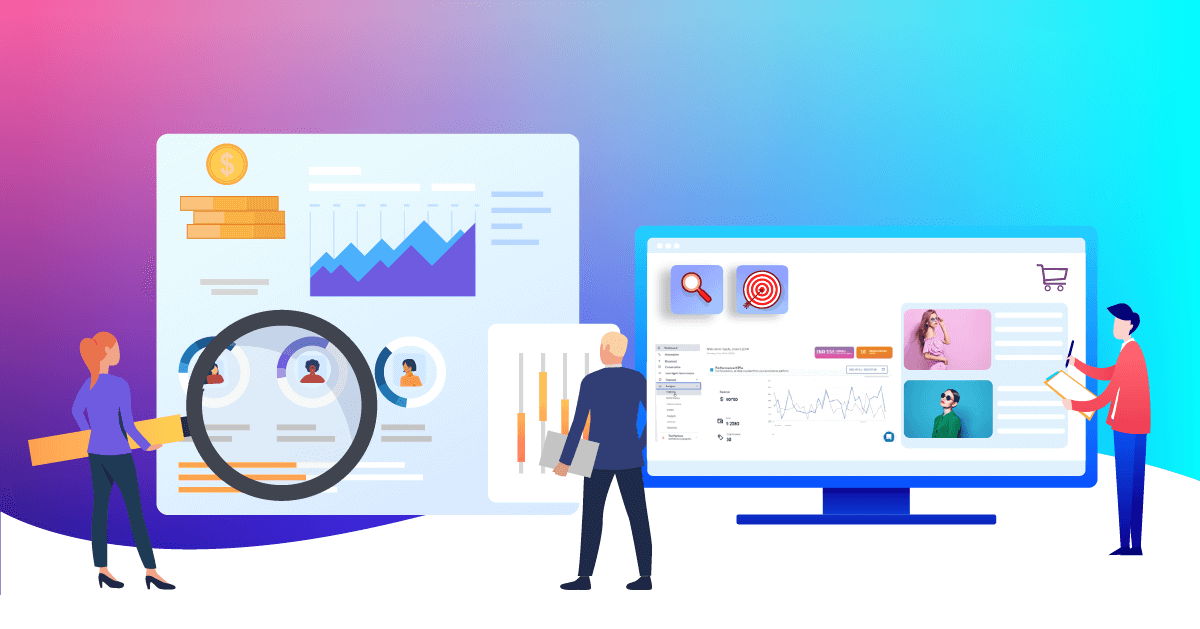Analytics are crucial to developing your e-commerce business ahead of the competition. Analytics is the guiding star that takes the place of gut instinct as you expand your online store and get more online sales.
What is E-commerce Analytics?
Monitoring and measuring e-commerce activities such as the number of visitors, the length of visits, shopping behaviors, and other similar behaviors is vital to understanding how well your online store is performing. It will allow you to make data-based decisions about how best to target future marketing efforts or what improvements need to be made.
This is what lies at the heart of e-commerce analytics. Further, We may categorize e-commerce analytics into six categories:
- Marketing – how effectively are you drawing visitors to your online shop?
- Conversions – how successfully are you converting those people into paying customers?
- Performance – how much profit have you made?
- Product – What items are flying off the shelves and which ones should be avoided reordering?
- Customers – people who are buying your product and are likely to engage with your brand for a long time.
- User Experience – How seamless is it to buy from your brand vis-a-via store navigation and touchpoints?
The metrics in each category will show you whether your store is growing the way it should be growing or if you’re about to tank it without even realizing it.
Why is E-commerce Analytics Crucial for the Success of Your Store?
Understand How You Are Performing
If you do not have a revenue, profit, or trend forecast to guide you through your forecasting, you will be flying blind. Analytics informs you on the current status (revenue), whether it makes financial sense to expand it (positive profit) or first optimize it (negative profit or loss), as well as what lies ahead.
Gain Strategic Insights as to What ‘Sells’
It’s not enough to simply determine whether or not your e-store is profitable; you must also ask why. You must also ask yourself if you want to repeat the recipe that brought about success since it is important to know which items are frequently repurchased and which ones gather dust on the shelf. You can use this information to better target your marketing efforts. Knowing which customer demographic spends more than others allows you to direct your funds and limited resources to areas where they will be most effective. Etc.
Develop and Offer Better Products
The success of an e-commerce business is largely determined by the items advertised and sold to the consumers. The proper product analytics help you figure out what products to sell (product selection), which pair well together (recommendations and upsells), and which products are costing you money (returns fulfillment costs into the profit margin).
Crucial E-commerce Metrics to Focus On
Now that you know what analytics is, where should you concentrate your e-commerce tracking? We recommend monitoring the following metrics regularly:
1. Customer Profiles
Customer profile tracking allows you to assess the level of interaction your consumers have with your e-tail brand. You can monitor what kinds of material and goods your consumers are most interested in, as well as which pages on your website they visit and intend to buy.
If you want to dig even further into the nitty-gritty of customer analytics, you may discover which items were added to or removed from the basket, as well as whether the checkout procedure was triggered without an order being placed.
For instance, Wigzo helps you create smart customer segments based on their behavior and Recency-Frequency-Monetary (RFM) values. These segments can then be laser-targeted for superior sales conversion.
2. Customer Lifecycle Mapping
Customers’ demands change as they traverse the customer lifecycle. As subscribers engage with your brand, they will have varying requirements based on their position in the consumer lifecycle. So segmenting contacts into stages in the customer lifecycle aids in prioritizing your marketing by connecting with your most active and valuable customers or appealing to those who require a little more love and attention to bring them back into the fold.
An end-to-end customer data platform with extreme marketing automation capabilities like Wigzo can help you map your customers’ lifecycle and engage them with the right automated communication at different stages.
3. Customer Retention Metrics
Retention analysis is a crucial method of assessing customer behavior after your product or service has been delivered, and it’s one that you should understand. Comprehensive retention analytics give you a 360-degree view of your new and repeat customers’ activities.
To stay up to date on your client base and what makes them tick, check these important retention reports in Omnisend:
Returning Customer Rate
What is the average life cycle of a customer who purchases from you? It’s possible to determine this by tracking how long individuals stay active on your site. This indicates how many people return after their initial purchase. If it’s large, you’re doing a fantastic job with your retention marketing!
Revenue From Returning Customers
This metric tells you how much money you made from your repeat buyers in a given time. You’ll have a better understanding of the true value of your most loyal customers if you look at this number.
Returning Customers AOV
This is how much an average order per returning customer is worth.
Setting E-commerce Standards
To assess your marketing performance, you must first establish where you stand against your immediate rivals. Get e-commerce statistics that are relevant to your e-commerce business and see how you compare to others in the same field.
Your turn…
We have already seen the power of cohort-specific retargeting and its positive impact on CLTV. It all starts with analytics – when you unearth the siloed customer data, and fuse it with an intelligent marketing automation engine.
Gain e-commerce analytics, marketing, and growth advantage now. Start your FREE trial for Wigzo now!













